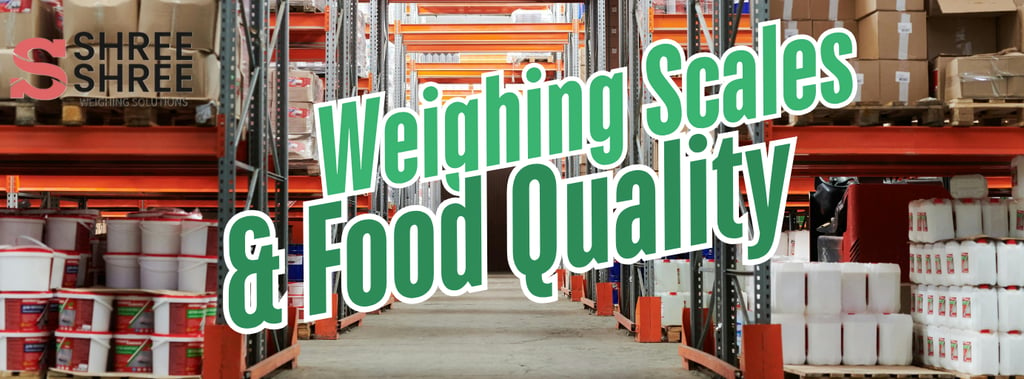The Importance of Weighing Scales in the Food and Beverage Industry
The food and beverage industry is one of the largest and most essential sectors globally, responsible for producing everything from raw ingredients to packaged consumer goods. Precision and consistency in production are paramount, particularly in terms of ingredient measurements, portion control, and product packaging. Weighing scales play a vital role in ensuring that food products meet safety, quality, and regulatory standards. In this blog, we explore the significant role that weighing scales play in the food and beverage sector, from manufacturing and processing to packaging and compliance.
4/28/20255 min read


1. Ensuring Accurate Ingredient Measurements
The first and most important use of weighing scales in the food and beverage industry is to ensure the accurate measurement of ingredients. Whether it's for baking, brewing, or the preparation of ready-to-eat meals, the correct proportions of ingredients are essential for consistency and quality.
Digital scales and analytical balances are used to measure ingredients with high accuracy, ensuring that every batch of food or beverage product has the right balance of flavors, textures, and nutritional content.
Ingredient consistency ensures that every product tastes the same, whether it’s a batch of bread, soft drinks, or spices.
Without reliable weighing scales, variations in the quantity of ingredients can lead to inconsistent products, affecting customer satisfaction and brand reputation.
2. Ensuring Food Safety and Quality Control
In the food and beverage industry, food safety and quality control are of utmost importance. Weighing scales are critical tools in ensuring that products meet safety standards and regulatory requirements.
Accurate weighing ensures that products adhere to ingredient ratios and recipe standards, which are critical for maintaining both safety and taste.
Weighing systems are also used to monitor ingredient quality by checking the weight of food products at various stages of production. This helps detect any quality issues or inconsistencies early on.
By using certified weighing equipment, manufacturers can maintain consistent quality and ensure that their products meet both safety and regulatory standards.
3. Supporting Portion Control and Serving Sizes
Portion control is a critical component of the food service industry, ensuring that customers receive the correct serving sizes, while also helping businesses control costs and minimize waste. Weighing scales are commonly used to measure and standardize portion sizes in foodservice operations such as restaurants, cafeterias, and catering services.
Portioning scales help staff quickly measure individual servings of ingredients, whether it’s meat, vegetables, or grains, ensuring that customers receive consistent portion sizes.
Accurate portion control reduces food waste, ensures customer satisfaction, and helps businesses stay within their budget.
By using accurate weighing scales, foodservice businesses can optimize inventory management, reduce waste, and offer a better customer experience.
4. Supporting Food Packaging and Labeling
Food packaging is an essential part of the industry, and accurate weighing is vital for ensuring that packaged food products meet weight specifications and regulatory requirements.
Weighing scales are used in packaging lines to measure food items such as snacks, canned goods, and beverages, ensuring that each package contains the correct amount of product.
Labeling requirements in the food industry often include the net weight of the product, making accurate measurements essential to avoid penalties or recalls.
Automated weighing and packaging systems ensure that food products are packaged correctly and consistently, reducing the chances of human error in the packaging process.
5. Compliance with Regulatory Standards
The food and beverage industry is subject to strict regulatory standards set by government bodies such as the FDA (Food and Drug Administration) and FSMA (Food Safety Modernization Act). Weighing scales help manufacturers comply with these regulations, particularly in relation to ingredient labeling, portion control, and safety requirements.
Certified weighing systems ensure that the products comply with local and international standards, helping businesses avoid penalties, fines, and product recalls.
Legal Metrology certification guarantees that the scales used in food processing and packaging meet the required specifications for accuracy and precision.
By using accurate and certified weighing scales, food manufacturers can ensure regulatory compliance and maintain a trustworthy brand reputation.
6. Improving Production Efficiency
Weighing scales contribute to the efficiency of food production lines, ensuring that ingredients are weighed quickly and accurately, which improves overall production speed. In addition to saving time, efficient weighing systems also help reduce the chance of errors, leading to smoother operations.
Automated weighing systems help speed up the production process by handling multiple ingredients simultaneously, reducing the time needed to prepare large quantities of food or beverages.
Batch weighing systems are often used to quickly measure large quantities of ingredients, reducing human intervention and increasing overall production capacity.
Using automated weighing solutions can help manufacturers optimize production time, improve workflow efficiency, and meet demand more effectively.
7. Waste Reduction and Cost Control
Accurate weighing plays a crucial role in reducing food waste in production. By measuring the exact amounts of ingredients used in manufacturing, food producers can avoid overproduction and reduce excess waste, which ultimately saves money.
Weighing scales help manufacturers track the amount of ingredients consumed during production, allowing for better control over resource usage.
In the packaging stage, accurate weight measurements ensure that products meet specific weight targets, preventing over-packaging and reducing material waste.
By optimizing ingredient usage and packaging weight, food and beverage companies can achieve cost control and improve their overall profit margins.
8. Monitoring Expiration Dates and Stock Rotation
In the food industry, it’s important to ensure that products are fresh and are used before their expiration dates. Weighing scales can help monitor stock levels and ensure that products with near-expiration dates are used first.
Inventory management systems that integrate with weighing scales can help track product shelf life, ensuring that older products are used first, reducing the chances of expired stock.
This also helps businesses maintain product freshness, reduce food waste, and avoid selling out-of-date products.
Weighing scales can be integrated into inventory control systems, providing a more efficient way to track and manage stock.
9. Enhancing the Beverage Industry Production
The beverage industry is a significant part of the food and beverage sector, involving the production of drinks such as juices, soft drinks, and alcoholic beverages. Weighing scales are essential in this sector to measure ingredients, control recipes, and ensure the correct volume of product.
Brewery scales are used to measure ingredients like malt, hops, and yeast in precise amounts, ensuring consistency in every batch of beer or other fermented beverages.
Liquids such as juices or sodas need to be accurately measured and blended to ensure taste consistency across production batches.
With accurate weighing systems, the beverage industry can ensure product consistency, quality control, and cost-efficiency.
10. Supporting the Global Food Supply Chain
With the globalization of food production and distribution, ensuring consistency and accuracy is critical in the food supply chain. Weighing scales help ensure that food products are accurately measured and labeled for international markets.
International standards for ingredient labeling, packaging, and shipping require precise weight measurements for exported food products.
Weighing systems used in customs and logistics ensure that goods comply with import/export regulations, minimizing shipping delays and avoiding fines.
Reliable weighing solutions are crucial for facilitating the smooth flow of goods in the global food supply chain.
Conclusion
Weighing scales are indispensable tools in the food and beverage industry, supporting everything from ingredient measurement and portion control to quality control, compliance, and cost control. By ensuring accuracy and efficiency, weighing systems help manufacturers deliver high-quality, safe, and consistent food products to consumers.
At Shree Shree Weighing Solutions, we offer a wide range of precision weighing equipment tailored to the needs of the food and beverage industry. Our solutions help you maintain quality, efficiency, and compliance throughout the production process.
Need Reliable Weighing Scales for Your Food Production?
📞 Contact us today for high-quality weighing solutions in the food and beverage industry.
📍 Visit our Ahmedabad showroom, or schedule a demo at your food manufacturing facility across Gujarat.
